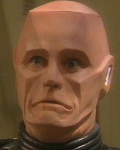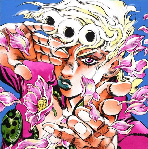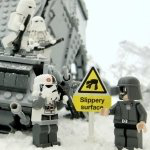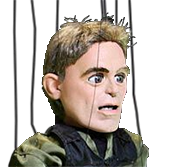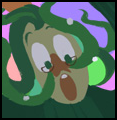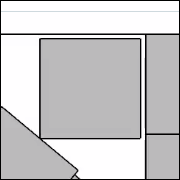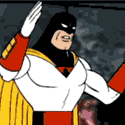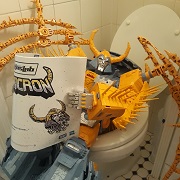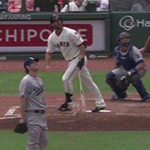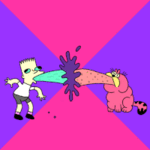|
at least this one actually served as a review of the episode unlike the heaven sent debacle
|
|
|
|

|
| # ? Apr 16, 2024 06:01 |
|
I got so sick of RTD's "family cowering in a corner" thing, I'm always glad to see somebody bring it up in any regard because it's nice to know I'm not the only one who noticed it constantly coming up. Like LtW I thought this episode is at its strongest in the first half when it's exploring Bill's life - her interactions with the Doctor, her flirting with Heather, who oddly hands-off relationship with her foster mother. The foster mother in particular fascinates me, because she clearly cares but there is this level of antagonism between the two of them that I think boils down to them being poor and kind of trapped living together even though Bill is a fully grown woman. It's also interesting how she doesn't quite seem to grasp who Bill is as a person, she gives her money for a present whereas the Doctor gives her that incredibly sweet, heartwarming gif (yes you're supposed to be touched by that scene, Lick  ), apparently hasn't grasped that Bill is gay even though it is clear that Bill isn't hiding that at all, and overall comes across as a distant figure despite being the person who should know Bill most intimately. ), apparently hasn't grasped that Bill is gay even though it is clear that Bill isn't hiding that at all, and overall comes across as a distant figure despite being the person who should know Bill most intimately.The jokes about Neville and the other ex-boyfriend feel like a misstep to her characterization, more like a pale imitation of Jackie Tyler's character which I guess goes back to those rather clear Rose parallels Lick talks about. I'm not sure exactly where they were planning on going with her character in this episode, she mostly acts as a point of contrast to the other people in Bill's like - The Doctor, Heather, hell even Nardole to a far lesser extent - but lacks any real character of her own.
|
|
|
|
After a year of no new Doctor Who and then a pretty poor Christmas Special, I went into season 10 with high hopes but a few concerns. Was Moffat phoning it in for his last season? Would Capaldi still be giving it his all? Was Matt Lucas going to work in his valet/quasi-companion role? How would Pearl Mackie work out as the new Companion? On the latter at least I was less concerned since the brief intro video released on her had made her seem charming and interesting. Happily, on the strength of this first episode of season 10 most of my concerns were allayed for the time being, as Pilot marked a strong return to form for the show after the uneven and ultimately unsatisfying season 9. Serving both as a reinforcement of the show's "values" for regular viewers, it also served as a soft reboot for new viewers to come onboard without having to worry too much about the backstory beyond "The Doctor is an eccentric alien who travels through time and space". I often (and still) recommend The Eleventh Hour as a good jumping on point for the show, but The Pilot is a strong contender too. 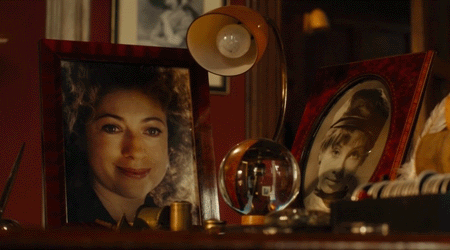 Bill is brought to an office by a whirring and clanking Nardole and left to sit alone and uncomfortable. Beautifully framed to show Bill's discomfort with the situation, we're also presented with a lot of important information that immediately gives us a read on the Doctor's own mindset. The TARDIS is tucked in the corner with an out-of-order sign on it, pictures of River Song and Susan Foreman on the desk marry the old and the new, as does the collection of classic/revival Sonic Screwdrivers. This feels like a retired Doctor, and the fact he has an office at all indicates a settling down, a decision for whatever reason to stay in place and reflect on the past rather than move forward into the future. It's not just the Doctor we get a read on but Bill Potts as well. Via the dialogue, flashbacks and of course Pearl Mackie's acting we immediately get a sense of who and what Bill is. Like the Doctor she doesn't quite belong, she's not a student but she's not "staff", she's the girl who works in the kitchen.... BUT she also attends lectures and demonstrates a curiosity and fascination beyond what you might expect. She sees things differently from others, approaches things from another perspective. When directly questioned she obfuscates with charming stories like how she accidentally made a pretty girl fat because she felt guilty about perving at her (and thus we immediately learn without it being a big deal that Bill is gay). She's noticed that the Doctor has supposedly been a lecturer for close to 70 years but the length of time doesn't intrigue her, but rather that he doesn't seem to teach any one consistent subject. In short she is smart, savvy, self-aware but also different. Mackie brings all this across without for one moment making Bill feel like a Mary Sue or unrealistic, her charm and confusion make her feel like a real person. It IS a little on the nose that the Doctor stares directly at the picture of his granddaughter Susan when asked why he has taken an interest in her, but his line about how she smiles when she doesn't understand something while most people frown is very nicely put. So he offers to become her private tutor, a shift in the usual Doctor/Companion dynamic. The Doctor is still "retired", but Bill can serve as a companion to him without them having to run off in time and space and risk the devastation that was his loss of Clara. A wonderful opening sequence following the credits parallels Bill's day with the Doctor's, as he presents a lecture attended not just by her but a pretty young girl with a star in her eye. We're given deeper insight into Bill's life inside and outside of the University - she has a foster mother, one who directly contrasts with the Doctor as "foster tutor" in that she clearly cares but also is ignorant of Bill as a person. The Doctor picked up on Bill's intelligence and perception immediately, but her foster mother isn't even aware that she's gay. Bill's sexuality is handled with surprising subtlety, while also making it about as clear as possible that yes, she is gay. Bill spends her nights at clubs drinking with friends, where she also meets that girl with the star in her eye, Heather. Heather was present at all the Doctor's lectures as well, and like Bill she's not only gay but perceives the world in a different way. But the parallels end there. Where Bill is happy, engaged and stimulated by University life, Heather is miserable, disconnected and just wants to be anywhere else. They contrast each other, but they are also attracted to each other, and the two keep connecting/meeting in a way that almost suggests fate but is really more down to the fact that they're both perceptive, intelligent young women. 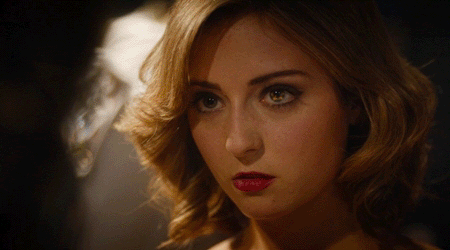 While Bill notices and investigates the Doctor and Nardole up to something mysterious down on the basement level of one of the University buildings, Heather is investigating the seemingly mundane puddle of water sitting in a caged off section of construction. The two meet in the middle of their respective investigations, where Bill's empathy comes into play when she notices Heather is clearly upset. While things get a little clunky as the show resorts to flashbacks to remind us of their meeting which aired bare minutes earlier, the dialogue and interactions between the two presents us a neat little flirtatious (on Bill's part) adventure that almost feels like a couple of kids going off to explore something weird the other saw. More of the contrasting personalities/outlooks of the two are demonstrated in their conversation. Heather sees the star in her eye as a defect, something to be fixed. Bill sees it as a star, something fascinating and wonderful. Heather expresses her desire to just get away from the university, and despite Bill saying how much she loves the place she still asks if she could come along. Both women notice what others don't, and both look into it rather than just ignoring it. But neither are credulous, they don't accept any old alternative explanation, they see what is wrong and they try to figure out a way to make it make sense. So Heather is trying to understand how the reflection of herself in the puddle of water could be wrong, and desperately wants somebody else to see it too because she probably suspects it is another sign of a defect within herself. Bill for her part senses something is wrong but has more of a sense of wonder about that, she's excited by the wrongness of it all while Heather is horrified. Unfortunately, after all this nuance the show blunders off a cliff with a decidedly awkward and ultimately pointless red herring where we see things from the puddle's perspective and hear a sinister voice declaring that the pilot has been found. The intent is obvious, to make us think something sinister is up and there is some villain behind it all, and it doesn't fit at all with the ultimate resolution of the episode nor make any sense once we finally find out what is going on. It's a flaw that has sadly become more apparent with Moffat's writing since season 5 - the desire to pull out the rug from under the viewer by making them think something is important/big only to wave it off at the end and concentrate on the generally far more interesting personal dynamic between characters. The Silence, The Hybrid (ugh), even this mysterious Vault at the bottom of the University, now this sinister voice in the puddle - the trick has worn thin by this point. Speaking of rugs, the Doctor gets one as a gift from Bill for Christmas that year, and comments that he got her nothing in return. Rather than a lesson they just spend some quality time together. We learn a little more about Bill, she can tell the Doctor is a traveller just by looking at him, even if he's supposedly spent the last 70 years working at the University. We learn that her mother died when she was a baby, and that she has largely created a fictional version of her mother to fill that gap in her life, since they have almost no pictures of her to act as memories. Bill comments that if somebody is gone, do pictures really help? This causes the Doctor to look to the pictures of River and Susan, and I'd argue that Clara is present by her absence too - the Doctor doesn't even remember her beyond the knowledge that there was somebody called Clara he once traveled with and valued: that is really important later on in the episode. Bill's foster mother here acts as largely a point of contrast, she never really demonstrates much character in her own right outside of a couple of quips about her disastrous love life (there is a sense of a watered down Jackie Tyler to her, to be honest). She gifts Bill money for Christmas instead of a thoughtful present, but meanwhile a far more meaningful gift has been "found", a box full of pictures of Bill's mother. Bill sobs as she looks through them, a window into the life and personality of a woman she never really knew, and spots in amongst them a reflection of the photographer, and it looks for all the world like the Doctor, who has clearly gone back in time to make this possible for Bill. It's a genuinely touching moment. 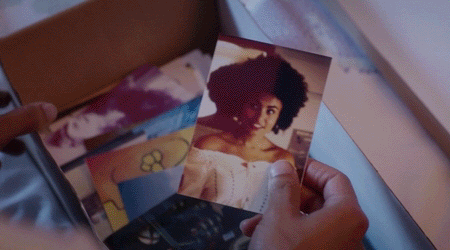 Everything to this point has been a really lovely introduction both to the Doctor's status quo as well (more than anything else) as Bill as a person. This being Doctor Who though, the action has to kick in eventually and this marks the point where they get out of neutral and start moving forward again. This is both a good and a bad thing: good because there needs to be some catalyst to move things along, bad because the story of Bill, her new private tutor and the girl she likes was really, really loving good. Bill spots Heather looking at the puddle again and is pleased to see that she seems more cheery than before. She offers to come around and take a look at the puddle herself, and Heather promises she won't go anywhere without her (!), so of course when Bill arrives Heather is nowhere to be seen. In order to up the tension/stakes, a lot of effort now goes into making things scary/unsettling suggesting there is danger involved. By the resolution of the episode, we see that there has been a misunderstanding, but in order to get to that point there are a lot of what felt to me like missteps. Heather is shown as a drowned corpse inside the puddle, the Water-Heather screams for no real reason and lunges at characters, and none of those things seem to have happened for any reason other than to make her look scary so we could later find out she wasn't really. With Heather's disappearance, Bill returns to the Doctor's office and tells him the full story, admitting that maybe she is reading too much into it but... and he's gone. In a wonderful comedic moment, the Doctor has already jumped out of his chair and is racing across the campus, seen by Bill from his window as she is still in the middle of telling him everything. He picks up on the puddle's problem, Heather saw it straight away because of the star in her eye - they're not seeing a reflection but a mimicry. Their faces are turned around because they're seeing it the way everybody else does, rather than the reflection in a mirror. He sends Bill off home with a lame explanation that it is an optical trick, where she gets creeped out when she realizes her foster mother isn't home but something is in the bathroom. Rather than call the police, she investigates herself (not in a dumb horror movie way, but more in a "she's too curious for her own good" one) and discovers the genuinely terrifying image of Heather's eye inside of her drain. In a panic she rushes back to the University but hesitates when she sees the Doctor through the window in his office, and then discovers Heather is waiting for her. With shades of the Flood from The Waters of Mars and the creature from Midnight, Heather mimicks everything Bill says while water drips from every surface of her body, lending Bill's own words a sinister double-meaning. Bill: You're dead. Water Heather: You're dead. I mean Jesus Christ, that's pretty terrifying. Bill rushes to the Doctor's office and barricades it, which of course is no barrier to Heather's entry. Fascinated, the Doctor pulls Bill into the TARDIS (and notably takes the "out of order" sign from it) which leads to an absolutely amazing visual.  The Doctor posted:Time And Relative Dimension In Space. TARDIS for short. You're safe in here. You're safe in here and you always will be. Bill's reaction is wonderful, as she once again takes things in from a completely different POV: Is this a knockthrough? It looks like a posh kitchen etc. The Doctor is, understandably, rather put out that she's not blown away. Doctor: What you are standing in is a technological marvel. It is science beyond magic. This is the gateway to everything that ever was, and ever can be. Bill: Can I use the toilet? Bill's slow realization of the TARDIS being bigger on the inside than the outside is beautifully handled, Nardole (who has just popped up from the loo himself) explains how it works in a neat callback to the 4th Doctor's explanation of it all way back in the 70s: it's just a simple matter of putting a larger box inside a smaller one! This seems to be Nardole's role in this episode, comic relief and a bit of a goofball. He clanks and whirrs in his first appearance and pieces are falling off of him, suggesting his body is largely a robot replacement for the one he lost in The Husbands of River Song. He runs in the wrong direction, eagerly follows the banter between the Doctor and Bill, and gets sent off to do the boring work later on so they can stick together for more dialogue. At this point, he's fun but feels largely extraneous as anything other than background dressing. Water Heather bangs at the TARDIS trying to get inside, and so the Doctor decides to first figure out what it wants, and then to put it through its paces and see just what it is capable of. Shifting first to the basement (Bill assumes the TARDIS is a lift) to see if Heather has any interest in their mysterious vault (like most viewers, she does not), they then get in a neat little time travel joke by moving location and finding themselves in daylight. Have they time traveled? Of course not... they've just gone to Australia! When Heather follows them there (and screams at Bill for no apparent reason) he jumps them across to the other side of the universe (it looks like the planet from Utopia) where he cheekily notes that oh yes, it IS a time machine too. When Heather follows them even that far (still screaming for no apparent reason), suggesting even time travel capabilities or GREAT patience, he decides to see how strong it is by running it through a sterilization process. In the midst of all this, even while terrified Bill can't help but ask questions and again demonstrate how she approaches things from a different POV. If the Doctor is an alien, then why is his ship called a TARDIS? That acronym only makes sense in English! Why disguise the TARDIS as something with a sign that entreats the reader to enter? For his part, the Doctor takes this as another excuse to educate and teach, as he queries whether the water being is actually evil or not, noting that hunger looks like evil to the eaten. He speculates that the water isn't a living being but some form of sentient liquid that made up a ship of some sort, imbued with some sort of intelligence or requiring one to guide it. There is again a sense of a callback here, the broken down time ship from The Lodger springs to mind - did it eat Heather for sustenance? Did it absorb her to act as a pilot? Is she still in there or is she gone etc? Unfortunately for Bill, the Doctor's idea of sterilizing fire and "old friends" is to jump into the middle of a war between a race called the Movellans (old school Who fans were delighted to see these wigged idiots return) and, of course, the Daleks. It's a clever use of the Daleks, which seem to be contractually obligated to appear every year in Who (even during the 2016 year of nothing, the Daleks still appeared in the Pearl Mackie introduction video!), playing up their deadliness without having to make them the focus of the episode. As Nardole is sent horrified in to run interference using an old Sonic Screwdriver, the Doctor leads Bill through the corridors and away from the Daleks (Bill, of course, is full of questions) as Heather tracks them down and finds herself face to face with a pissed off Dalek... sorry for the redundancy. Nardole manages to quarantine the fighting but Heather has escaped, taking on the form of a Dalek herself and gurgling,"EXTERMINATE!" at them. But it doesn't, shifting back into Heather's form as the Doctor notes that it had the use of a gun and had it wanted to, it could have killed them... so why not? It killed Heather but it isn't aggressive, so why does it keep coming after them?  Bill talks about Heather's last words to her, promising not to go without her, and the Doctor finally figures out this hasn't been a chase but an invitation. The trouble is, he doesn't know if it is still Heather's mind inside there making that call, or just some last remnant of her memory that got jammed into the alien intelligence that ate her. Is Heather still Heather or just an approximation? Thankfully Bill has some experience here, and realizes the best way to handle this is as a crush rather than a threat. So she lets her down gently, mimicked by Heather who whether knowingly or unknowingly is agreeing to let Bill go. But then she finally does something that isn't just a copy of somebody else, as she slowly reaches a hand out towards Bill. Despite the Doctor's warning, Bill reciprocates and they touch hands, and Bill gets a glimpse of the universe laid out in front of her, hers for the taking should she want it. In her head she hears the Doctor warning her, whatever she is seeing is a trap, a lure to get her to give herself up. But once again Bill sees things from a different perspective: this isn't a chance for the alien ship to lure her, this is HER chance to get to the core of the matter and speak directly to Heather if she is still in there. And she is, Heather is truly the pilot, just reconstituted into the make-up of the alien ship. The two connect and Bill is able to say her goodbyes, to thank Heather for the offer but to turn her down. Heather lets her go and disappears, the "threat" has been dispersed, they are safe. Nardole is concerned but the Doctor insists Bill is fine, causing Nardole to comment that he never notices the tears. Bill hadn't either however, and notes quietly that she doesn't think the tears belong to her. Returned to Earth, Bill and Doctor come down from the adventure in his office, where she comments that she saw a chance to explore the universe and turned it down. She turns a meaningful look at the TARDIS but the Doctor immediately shuts that down - it's unacceptable. Yes he took her onto the TARDIS, yes they traveled through Time and Space, but it was for a distinct purpose and now that is over, and things must return to the status quo. He really means it too, as he suddenly reaches out for Bill's face offering to "fix" things. She recoils, not because she thinks he's going to try and kiss her, but because she's seen enough sci-fi to know that he probably intends to wipe her memory somehow. Surprised at the accuracy of her guess (if not the source of it), he explains it is a necessity and she tries to bargain him down - let her remember, at least for a little while. Hell even a week... give her the night at least. But even as she bargains, she knows the futility of it all, and finally in weary acceptance she allows it to happen... but not without one final admonishment, how would he feel if it happened to him? In a truly sweet moment, Clara's theme chimes in and the Doctor considers how badly her loss affected him, and he acquiesces. He lets her go, and she rushes off, stopping only to take a moment to remember and be thrilled that everything is still there in her head. Back in the Doctor's office, he looks at the silent pictures of Susan and River and argues with "them" that he can't take on another companion, his duty to the vault means he must stay here. Even the TARDIS seems to speak up, but he is insistent. He must remain, he can't have another companion. So we draw to the close of the first episode of season 10, a huge step-up from the Christmas Special and a great introductory episode of the show. Yes there are a ton of callbacks/references to earlier episodes (Classic and Revival) but I didn't get any sense that they would be alienating ones. At its core this is a great story about a young woman opening up to the world and getting a chance to live up to her potential. About an old man who has forced himself to settle down but can't help from getting involved and trying to make things better, to help others to grow and improve, to do right by them (that box full of photographs is one of the nicest things the Doctor has ever done). It's a story that doesn't need high stakes or a big alien monster. It has them, yes, but it doesn't need them. Had this been a one-off or a special, I would have been begging for Pearl Mackie to return as a regular companion. Happily I didn't have to, I really liked Clara but Bill is the 12th Doctor's first companion he can truly call his own, and it's a drat shame she didn't get to show up until his final season. Bill walks out onto the campus at night, the universe a lot bigger than she ever thought, the endless possibilities thrilling. Not quite as thrilling as the sight that greets her though. After a tremendous introduction by Pearl Mackie, Bill has been established as an intelligent, thoughtful and empathic person who deserves more from her life. And the Doctor can't deny that. The TARDIS sits on the grass, the Doctor outside to welcome her in with the only explanation the show will ever need: 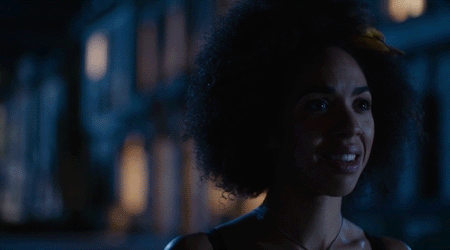 The Doctor posted:Time And Relative Dimension In Space. It means "What the hell." Jerusalem fucked around with this message at 02:43 on Jul 16, 2017 |
|
|
|
Fun thing about the framing of that opening scene: one door behind Bill is closed, the other ajar. Asymmetrical, like the star in Heather's eye, and like her final line, the only time she's not just repeating what Bill says. I think if they'd had a few extra minutes Heather's apparent aggression might have been explained away as teething problems, glitching as her personality was integrated into the water ship monster thing whatever it was. It feels like Moffat really started to tend more to explaining by implication as the years went on. Speaking of, I wonder exactly how Nardole "ran interference". It looked like all he was doing was running around pointing the sonic screwdriver at things and making them blow up...
|
|
|
|
2house2fly posted:Speaking of, I wonder exactly how Nardole "ran interference". It looked like all he was doing was running around pointing the sonic screwdriver at things and making them blow up... The Doctor mentions towards the end that Nardole was quarantining the actual battle, presumably blasting those panels was shutting down corridors/doors. The idea was to trap Heather in with the Daleks and the Movellans, but she killed the Dalek, occupied its shell and managed to keep up with them, maybe because Nardole got interrupted while working on frying that last panel. Hell the "Dalek" that interrupted him may have even been Heather, the Doctor noted that her gun would have worked but that she chose not to use it on them. It's frustrating that sometimes the show will leave things up to the viewer to figure out, which doesn't always work out but at least isn't holding our hands. But then they'll also do these clumsy flashbacks complete with whooshing sound effect to remind us of things we saw a couple of minutes earlier.
|
|
|
|
Huh, actually, this could explain what the creature from Midnight was? I mean, if it was a different piece of the same kind of ship, it might also mimic language without the dripping water effect, and it would explain how it could exist on the surface of a planet where nothing could survive. I mean, obviously Midnight is much better without an explanation, but it's an interesting thought.
|
|
|
|
The Midnight creature had some pretty clear sinister intent. Despite the fakeout of the creepy voice rasping,"PILOT HAS BEEN FOUND!" Heather seemed to have had a cooperative relationship with the "ship" (I presume her happiness the last time she sees Bill before being "drowned" is because she has communed with it and agreed to go along with it), more along the lines of The Lodger only this time with the pilot being a willing participant. Plus like you said, Midnight is better left as unexplained, some creepy loving thing out there in the universe beyond our comprehension, who even the Doctor couldn't get his head around.
|
|
|
|
Congrats, dw, for listening to my review, I felt it was very good as well
|
|
|
|
Lick! The! Whisk! posted:Congrats, dw, for listening to my review, I felt it was very good as well That's why they spent so long with those Wimbledon commentators, Chibnall was talking down a sobbing Eddie Redmayne after already promising him the job 
|
|
|
|
Redmayne's too busy being the Doctor of the Harry Potter world anyway. cba to go into the main thread but love the choice of Whittaker, she rules
|
|
|
|
Jodie Whittaker. *click* Have you watched Broadchurch? Grouchio fucked around with this message at 19:15 on Jul 16, 2017 |
|
|
|
Grouchio posted:Jodie Whittaker. Yes it was great why?
|
|
|
|
Broadchurch is a bad show I stopped watching early on but she's real good in Attack the Block
|
|
|
|
Jerusalem posted:The Midnight creature had some pretty clear sinister intent. Despite the fakeout of the creepy voice rasping,"PILOT HAS BEEN FOUND!" Heather seemed to have had a cooperative relationship with the "ship" (I presume her happiness the last time she sees Bill before being "drowned" is because she has communed with it and agreed to go along with it), more along the lines of The Lodger only this time with the pilot being a willing participant. Up to this point I had assumed Heather had been killed and her personality stolen, but I really like that interpretation that she knowingly joined with the ship and it fits her character better.
|
|
|
|
Senor Tron posted:Up to this point I had assumed Heather had been killed and her personality stolen, but I really like that interpretation that she knowingly joined with the ship and it fits her character better. It's why I think the red herring of the raspy evil voice was such a mistake - it would have been better to leave it as a silent watcher so we could make the assumption something horrible had been done to her, so the revelation that she's actually a willing participant and we the viewer (and the Doctor) had been biased unfairly. By having it rasp and snarl and scream and lunge it gives the whole thing a clear sinister vibe and makes the Doctor's mistake (and the viewer's interpretation) seem reasonable.
|
|
|
|
I just got to this thread, and the Superman/Spider-man comparison in the first review really snapped an adjacent opinion I'd had about Moffat, and Matt Smith's Doctor in particular, into clarity. When I first read the idea that Davies' Doctor was a superhuman and Moffat's was an ordinary flawed man, my first reaction was that that seemed backwards. But as I worked through why that could be, I found the dissonance at the heart of my own issue with Eleven's run: my feeling wasn't about the character, but the universe. Davies' arcs occur incidental to the Doctor, an entire grand history that he happens to exist in - the alternate Earth, the return of the Daleks, the journey of Rose Tyler (whatever you think of her). Moffat's are all about the Doctor; his past and future ultimately, literally defines the beginning and end of reality. "Doctor who?" and all that. I used to be really down on Smith's Doctor. After chewing on this contradiction for a while, I feel like I feel much better about Eleven as a character and only down on Moffat's plotting. And I think not fully separating those made me more down on Moffat's Doctor(s) than I should have been because every time he talks about how horrible he is or wonders if he's good, all of Creation aligns to either ask or answer that question. His flaws, filtered through the grandiose plotting, only serve to make him seem more epically special in a blatant way. And I didn't like it. But with distance, and Occ's perspective, I can kind of separate the characters from the clumsy plotting they were in and respect them as fictional people. I don't know what the moral of this post is. Thanks, I suppose.
|
|
|
|
^^^^^ this is a good post
|
|
|
|
I was kinda down on Pilot for one kinda petty reason in that I'm getting a bit weary of the monster being just one of the characters but looking a little freakier. Like we had "watery zombies" in Waters of Mars and while the explanation and mechanisms were different the visual is similar. (The similarity to It Follows also doesn't help). Like yeah it's a low budget show and "terror in the familiar" is something the show does, but it felt a bit too samey to make the best intro. It's a good intro for Bill but I was left thinking "okay now let's have a crazy mad adventure please."
|
|
|
|
Maxwell Lord posted:I was kinda down on Pilot for one kinda petty reason in that I'm getting a bit weary of the monster being just one of the characters but looking a little freakier. Like we had "watery zombies" in Waters of Mars and while the explanation and mechanisms were different the visual is similar. (The similarity to It Follows also doesn't help). They set it up that he had been good for 70 years guarding the vault and playing at being a professor so we'll know that what is in the vault is super important (even though no one cares). The way this episode is set up gives him an excuse to start playing a little fast and loose with guarding the vault, while not totally abandoning it. If he just goes off and does something because he is bored then Nardole will be super pissy.
|
|
|
|
Just a reminder, folks, we've got another review coming up in a couple of days, so if you haven't sent me your guess for the next episode, you should do so soon!
|
|
|
|
cargohills posted:I'm really not convinced that RTD is so much worse at working class representation than Moffat. Even just looking at the companions, Rose has a poo poo job and lives on a council estate with her mother, and Donna is a temp who lives with her mother well into adulthood. Martha is the most middle-class of the three outwardly due to the whole medical student thing but she also lives iirc with a single parent. I agree with this, especially in Clara's case. She's a conspicuously wealthy schoolteacher who integrates herself into the Doctor's entire timeline and all his past incarnations. She wants for nothing, she struggles with little. Canonically, she's more than just a companion, she's THE companion, incarnating over and over again to help the Doctor in some way throughout the entire expanse of his existence. And yet in practically every one of her episodes, she's a helpless victim whose only agency is to patiently wait for the Doctor to rescue her. For all the plot importance that Moffat assigns to her, he only ever uses her as the damsel tied to the train tracks, over and over again. If I go back and watch an episode with Ace or Nyssa or Romana or Sarah Jane Smith, Clara seems like a regression in a lot of ways, more than 40 years later. While I liked RTD's effort to normalize gay relationships on the show, it was usually so ham-fisted and terribly written that I couldn't help rolling my eyes. For me, Moffat's whole run had the opposite problem, his politics are half a century out of date. edit: all that said I really like Bill, but I don't think Moffat redeems himself with her for reasons I probably shouldn't talk about until OP has finished the season edit2: I forgot about Zoe! Doctor Who had a girl with a mind on par with the Doctor's, who loved science and comic books and regularly saved everyone's bacon with the power of her brain in nineteen sixty loving eight. Dr. Fishopolis fucked around with this message at 21:40 on Jul 21, 2017 |
|
|
|
You're out of your mind if you tell me Clara, especially with Capaldi, is a damsel in distress.
|
|
|
|
Moffat wrote 15 episodes featuring Clara, and I'd say at a generous estimate she has a damsel-in-distress role, given a broad interpretation of that term, in ooh, 9-10 of them? That's a lot but includes stuff like her delusion of still being human in Asylum Of The Daleks, her sacrifice in Name Of The Doctor, and her technically being kidnapped by cybermen at the start of Death In Heaven. Basically any time she's in danger and gets saved by someone else(or not, in the case of Asylum and Snowmen)
|
|
|
|
In contrast: Flatline, Hell Bent, Mummy, Kill the Moon. Clara is co-protagonist by the end of her tenure.
|
|
|
|
She does gently caress-all in Mummy and her role in Hell Bent literally starts with the Doctor saving her from death.
|
|
|
|
All through that season she saves the Doctor or takes risks to help him. She looks capable throughout. Does showing weakness (being outwitted, whatever) at any time whatsoever constitute a damsel in distress?
|
|
|
|
Dabir posted:She does gently caress-all in Mummy and her role in Hell Bent literally starts with the Doctor saving her from death. That whole episode is questioning the definition of "saving" with the Doctor clearly established as being in the wrong
|
|
|
|
Well, OK, but it ends with her jetting off in a stolen TARDIS to be immortal and have adventures with her immortal best buddy entirely thanks to the Doctor, so forgive me if it seems a little noncommittal.
|
|
|
|
I kind of dislike it when someone barges into a review thread, shares opinions unrelated to the current episode, would require spoilers to discuss further, and have no interest taking the reviewers past opinions into account as premises and basically excluding the reviewer in any way. This conversation would be far better in the normal thread. I guess the episode gives little to talk about. I guess.. well, thinking about the other companion intros this is actually closer to rose than I realized. Unlike Amy or Clara there is no deep connection with the doctor. I think though that I liked how unlike most of the companion intros, the last one is only hinted at and referenced. Yeah, it's necessity by the mindwipe but the doctor going non functional after each departure has worn thin and I like that bill is not a substitute for anyone.
|
|
|
|
I haven't seen the episode yet, so the episode 2 review might be up late (as in, like, tomorrow). Dunno yet.
|
|
|
|
https://en.m.wikipedia.org/wiki/Smile_(Doctor_Who) In which everything is on fleek.
|
|
|
|
Doctor Who "Smile" Series Ten, Episode Two "Smile" is frustratingly bad, because it's about two inches away from being good. Great, even. Video games are almost universally terrible at moral conflicts, usually choosing to illustrate them as black or white choices (like in Bioshock's (in)famous "choose whether or not to kill a little girl with your bare hands so you get more superpower juice" Little Sister decisions). When they attempt morally complex dilemmas, there's usually a difficult to obtain but "perfect" third option that nets the player the best possible outcome. It's a symptom of a problem that video game stories have of not willing to, and not being able to, confront the players. The most notable example of this is Mass Effect 3. The end of the game has you, Shepard, choose between destroying the big bad cyclical evil that wants to destroy all sentient life in the universe but in the process also destroying all artificial intelligence (of which there are multiple AI races in the galaxy, many of whom are your friends and co-workers). Or, you can decide to take control of them, but in the process also taking control of (and in the process destroying the agency of) all artificial intelligence in the universe as well. And, again, there are multiple AI races in the universe, many of whom are your friends and co-workers. Leaving aside the tortured way the choice is presented, that itself doesn't really make any sense when one thinks about it (why, exactly, would destroying all the Reapers destroy all the Geth and EDI besides "so you can have a hard choice"?), the choice boils down to a difficult and thus interesting one: Either you can kill all non-organic life in the galaxy, or you can take over it. Genocide or Slavery. Either way, you're a monster, and Shepard commits a horrible act. The problem is that there's a third option, that's only obtainable if you beat the game under a specific set of conditions, wherein Shepard instead chooses to merge all artificial and organic life in the universe, meaning everyone and everything stays alive, the big bad guys no longer exist, everyone's tech still works, everyone keeps their agency, etc. It's the "perfect" third option that completely and utterly falls apart because it doesn't adequately explain what having every organic life merged with artifical life means (in its most laughable shot, it shows an image of an all teched-out leaf on a tree or something. MACHINE TREES!), and doesn't think for one second its broader implications. Forcing every organic life in the universe to become partially artificial, and every artificial life to become partially organic, is a massive infringement upon everyone's agency. It's not significantly better, or really different, from Control/Slavery - you, the player character, decide for a group of sentient individuals without their input, in an irreversible decision. But the game sort of plays off its really ugly and glaring moral failings by pretending everything is perfect in Synthesis, because the player worked really hard for it and deserves to feel good about it, drat it. But it's indicative of a larger unwillingness in video game storytelling to have a position and follow that position through. Regardless of medium, in storytelling you need to honor the stakes of the world and its characters that you have established as that world's writer, even and especially if that means it'll make people "feel bad" about it. If you don't, you're being a spineless coward like the end of ME3, and you end up pissing everyone off anyways. It makes for emotionally dishonest, and therefore not connective, storytelling. (As an aside, this is why my favorite video game of all time - NieR - is my favorite video game of all time. Without going into spoilers, the end of the game has the player character realizing how monstrous of a person they are and making a final choice between being even more monstrous to achieve his goals or trying for at least some level of redemption while paying a heavy price for it, and it's one of the most emotionally effective things I've ever witnessed.) This is the central problem "Smile" has. It has so much good going for it - it's a well acted, beautifully shot hour that has some of the best set design in the series. "Smile" is also, essentially, a bottle episode, which is huge for the first post-onboarding Companion episode. In some ways, the episode right after the Companion introduction is more important, because the "onboarding" ep is given a lot of leeway to be suboptimal. It also doesn't necessarily establish how the Doctor-Companion dynamic works - some of them do, like "Eleventh Hour", where Amy arrives in Who exactly how she'll be for two and a half seasons. In contrast, "Rose" has barely any Doctor-Rose interaction, and the episode immediately following - "The End of the World" - is where the audience begins to see the Nine-Rose stuff take place. Onboarding often has to juggle introducing a Doctor, a Companion, sometimes both, and its main story, and as a result the central relationship this show operates around - The Doctor and his Companion - can be pushed into the background of an intro. Making the very first episode of a new Companion and her Doctor a two-hander means "Smile" can really drill down and establish Bill and Twelve's dynamic, and it succeeds admirably. As far as I can remember, this is the only time the post-onboarding episode had only The Doctor and his Companion in it. Technically speaking, obviously, there's the young boy and the small group of just-unfrozen colony dwellers, but they're collectively a plot device with a pulse. For all intents and purposes, Bill and Twelve are the only people in "Smile". Helped by a crackling script by Frank Cottrell-Boyce, "Smile" sketches both Twelve and Bill as full characters with a very unique relationship. Continuing the theme of Clara's overwhelming influence on Twelve, Twelve and Bill have the most explicit, and traditional, teacher-student relationship on the show. Nine and Rose was a depressed biker and his groupie sort of jetting around so he wouldn't feel so terrible all the time. Ten and Rose was the creepy teacher-student relationship, like the one that ends up with them getting married the instant she graduates while she's seven months pregnant. Ten and Martha was the rebound as that marriage eventually goes sour. Ten and Donna was him and his platonic best friend trying to get their lives back together on an intergalactic road trip. Eleven and Amy was a joker who felt bad for his fuckup trying to fix the person he hosed up. Eleven and Clara was...not a relationship, sorry, they were just two people who happened to be in the same location for like seven episodes or whatever. Twelve and Clara had the big theme of teaching, but it was more back-and-forth, with each influencing the other just as much as they were influenced by the other. Bill and Twelve, on the other hand, are a teacher and his student. All the other Doctors felt like they went exploring with the TARDIS because "He didn't have anything better to do" or "He has an incessant need to adventure" or "He needs to forget or address his problems or failures". Twelve feels like he takes the TARDIS, and Bill, places because he wants to impart a specific lesson to her, so every time they go to somewhere in time or space it feels like a field trip. For her part, Bill comes across as the excessively eager student who wants to accumulate more knowledge just for the sheer joy of accumulating more knowledge, without an ulterior motive. Which basically makes her the only Companion who wanted to do that - Rose was motivated by lust, Martha by nothing because she was badly written, Donna by self-hatred, shame, and entitlement, Amy by trauma, and Clara by expectation and responsibility. Bill is there just to be there, and her purity of purpose is super refreshing. By shedding all excess characters until the third act (which, coincidentally, is when this episode completely falls apart), we get thirty uninterrupted minutes of the Bill and Twelve show, and I've honestly never come so quick to grips with any character on Who as I do with Bill in "Smile". Coming out this hour, I feel like I have a complete understanding of who Bill Potts is and why she does what she does. As a pure episode, "Smile" is also one of its prettiest and most effective. The set design is aces, with the lighting bringing a sort of otherworldly ethereal aspect to everything that makes the introduction of its antagonist all the more jarring. And the robot design is genuinely pretty great - it's tough to pull off Emoji villains but the weird binary portrayal of the robots' emotions come across in the unsettling way "Smile" intends. I think, in isolation, this episode is really well-done. Like, if you were to view this having seen none of Moffat's ouevre, it's an incredibly accomplished episode from an empirical standpoint. Its sets look great, its shots and lighting look great, the villains are interesting and engaging, the dialog is great, the pacing is pretty good. The problem is that if you look at it as the second episode of the sixth season Moffat has showrun, it's a very derivative episode. The bug things are almost exactly the Vashta Nerada, the set design and robot design feels like someone took the sets and robots from "The Girl Who Waited" and updated them for 2017. The name of the episode feels, like "Blink" and "Listen", a one-word action for a biological function that encompasses a horror episode of Who meant to operate as deeper symbolism for something else. There's memetic phrasing and things people normally do that's given a dark edge. I would slam it more if it was written by Moffat, but it's not. Still though, basically every minute of this I felt like it was someone reaching into Moffat's bag of tricks, taking something he has done many many times before, barely changing it, then writing it in. It was good, but it felt so deeply like I had seen literally all of it before somewhere else in Moffat's Who. Then, of course, we get to the climax and resolution, where the episode collapses in on itself completely. There's so many - I hesitate to say unique, because they're all very hoary sci-fi tropes - but they're all interesting ideas that "Smile" presents. There's a question of whether or not the Vardy are being enslaved. There's the reveal that the Vardy were killing people because they misunderstood how human emotion works, which itself ties into the Emoji conceit brilliantly. There's the reveal of the colonists having been cryogenically frozen, of the Vardy immediately and suddenly gaining sentience (or did they always have it?). None of it is at all original, but these ideas are always cool to ruminate on, so they work despite their obviousness. The problem is in the resolution. After about thirty minutes of scene setting and Bill and Twelve joking around, the episode suddenly - and effectively - sets up this massive, ugly confrontation between both the Vardy and the humans where neither side feels wholly in the right or wrong. Twelve has to solve a situation where they're all about to kill each other, as an outgrowth of a fundamental misunderstanding. Basically, it's a moral dilemma with no good options. Either he somehow disables the Vardy, which is essentially lobotomizing a newly-sentient race of creatures, or he lets them kill the humans. Genocide or Control. So the problem is in the punt. His decision to essentially "reset" the Vardy, also making them into a weird native analogy (possibly as a satirization of or commentary on British imperialism?) comes across as a cheat. And that's not even the damning part - The Doctor was presented with an impossible situation, with no good solutions, and he made one that was the least worst possible. It's the Gordian knot, and he cut it in half, which is itself not the problem. Cheaty, sure, but it was a rigged game where the only option was to cheat. As he himself notes, he only wins chess by flipping the table. The problem is that "Smile" presents his solution as a perfect one, that had no moral problems attached to it. Twelve resets the Vardy, smugly grins at everyone while crowing about how much of a loving genius he is, then goes off in his magic telephone box. The issue with this is that if you think about the resolution of "Smile" for even a second, it's pretty loving terrible. I mean, he mind-wiped an entire race of creatures. That's absolutely messed up regardless of whether or not he was right in doing so, and whether or not it was the only option he could make. The flippant, self-satisfied air with which "Smile" treats his choice is really kind of gross and fundamentally misunderstands the implications of his choice, and leaves just as bad a taste in the mouth as Synthesis does in ME3. It sucks from all angles. Twelve just mind-wiped and essentially rewrote an entire sentient race - something he had this huge issue with doing literally one episode prior. The human survivors are essentially cowed into being unable to mourn their dead, because the offenders literally do not remember the murder they committed. If the Vardy are slaves, which "Smile" heavily implies to outright states they are, making them "not slaves" and forgetting that they ever were slaves doesn't make the central offense the humans committed - slavery - suddenly "okay". And if they were slaves, then they had agency (because slavery is the inherent deprivation of agency), which means they were murderers. And you can't explain it away "Well, they were robots and thus lesser than humans" because this massive theme of the episode is The Doctor hectoring Bill for not respecting artificial life as much as organic life. It makes the resolution even more disingenuous then before, because "Smile" bends over loving backwards to make the point that robots and humans are equivalent, then resolves the episode by mind-wiping one so they don't kill the other. Twelve pushing a literal reset button absolves everyone of responsibility while simultaneously refusing to address any difficult questions this episode raises. And, again, this would all be fine if the episode took the tack of "The Doctor had to make a terrible choice (mind-wiping a race) to prevent an even worse one (them killing all the humans)." It's fine to cheat, and it's fine to give a lovely resolution if the media represents that option as lovely. Synthesis sucked as an ending logically speaking in ME3, but it sucked especially because it presented itself as the perfect solution that had no problems attached to it. Which is fundamentally untrue! The Doctor did a bad thing, and whether or not it was necessary or was the least worst option available doesn't make it not a bad thing. It's more frustrating because, as I noted previously, this episode feels so aesthetically similar to "The Girl Who Waited". Which is an episode that ends with The Doctor making a lovely decision that ends up literally killing another human being, that was itself the least worst option available, but at every point after that decision the episode underlines how awful his decision was, even if it was the right one. Rory Williams, The Best Companion Ever of all time, literally says to Eleven "This isn't fair. You're turning me into you." in response to Eleven forcing him to leave old Amy to die. It's an episode that makes you, the viewer, feel lovely after having watched it, because there was no good solution. Eleven did the necessary thing, but it was still wrong, and "Girl Who Waited" never shied away from making sure the viewer understood it. As a result, "Girl Who Waited" is a magnum opus that presents a hard moral question that it answers honestly, and therefore memorably, in comparison to "Smile"'s complete and utter spinelessness, capped with the show attempting to reassure us about how much of an awesome genius Twelve is. It's not offensive in, say, the way "Zygon Invasion/Inversion" or "Kill the Moon" were offensive, wherein those episodes expressed some really malicious and terrible views, but it's still offensive because it's clear nobody actually thought through the implications of the climax. It paints a big happy unearned smile over a really awful thought, sorta like if you tweeted something really loving terrible and ignorant and appended a dumb loving emoji at the end of OH poo poo THIS IS A BRILLIANT EPISODE Grade: D Random Thoughts:
|
|
|
|
I don't dislike the ending as much as you, but I was disappointed in it. They were so close to a great ending with the Doctor realizing that the Vardy are developing sentience, I was positive it was going to result in the Vardy grasping the concept of grief for the first time and coming to an understanding of the horror of what they'd done. Then the two sides would have been left forced to work together as equals after that with the enormous horror of that misunderstanding left hanging between them. The biggest problem is the mindwipe, it follows immediately on from the previous episode establishing that a mindwipe is a bad thing, and to make it worse the Doctor only mindwipes the Vardy, not the humans. If you're going to reset everything, reset the humans too, even if that is just cribbing from Day of the Doctor. But everything before the ending is so good, and the Doctor/Bill relationship is endlessly fascinating. I love the Doctor's desire to teach is also accompanied by his desire for adventure and he wants so desperately for Bill to fall back into the familiar old companion role so he can have his cake and eat it too. But she's her own person, and I really dig how she keeps approaching things from that different perspective/take on things.
|
|
|
|
As the second episode of the season, Smile's job is to build on the new relationship between the Doctor and Bill, develop a bit more of Bill's character, AND stand alone as an episode in its own right. I think it mostly succeeds in all three categories, which is doubly impressive since it is written by Frank Cottrell-Boyce who gave us the rather awful In the Forest of the Night in season 8. Opening in the console of the TARDIS, the Doctor and Bill are at cross-purposes, and I think it says a lot about both. The Doctor is all about instilling a sense of wonder into Bill, he speaks with wide-eyed romanticism but is stymied at every turn by Bill's wonderful sideways perspective. As he waxes poetic about the potentialities, she speaks up to ask why he keeps the chairs so far from the actual console. It's an interesting take on the normal Doctor/Companion dynamic, and speaks to the Doctor's clear desire to branch out from his "retirement". He wants the vicarious excitement and thrill that a new companion brings, but as much as she loves the chance to explore, Bill is more than just a conduit for the Doctor's desires, she's a person in her own right. Nardole acts as spoiler, showing up demanding to know what is going on, what they're planning etc. He reminds the Doctor of his vow to guard the vault, his duty and responsibility etc. The Doctor insists that he is just showing Bill around and will be taking the TARDIS back to his office momentarily, demanding Nardole prepare them a cup of tea. It's an interesting power dynamic between the two, the Doctor dismisses Nardole, but he also has to answer to him and justify his actions - I find the nature of their relationship far more interesting than the macguffin they've both vowed to guard. With Nardole gone, the Doctor reminds Bill once again he's a time traveler, he can uphold his oath easily enough and continue to guard the vault by simply returning immediately after leaving. So where does she want to go? The future. Why? Because like we learned last episode at heart she is an optimist, and she wants to see if the future is "happy". The answer, of course, is complicated.   The introduction to the colony planet is really strong, it could easily have been the cold open to the episode, and I imagine it probably was in the initial script. As is often the case in Doctor Who, it's the mundane made terrifying, the familiar turned fearful. It's a beautiful planet, a beautiful setting (they shot at the Ciudad de las Artes y las Ciencias but beneath the facade of that beauty is pure horror: the horror of "happiness". A woman walks in from the grain fields with her cute helper robot, exhausted but satisfied by her day's work only to be told by her desperately grinning sister (I think?) that their mother is dead, and in fact so is most everybody else in the city. When Kezzia gets upset at this "joke", the robots following them around become equally upset and take quick steps to "solve" that problem. So the Doctor and Bill arrive to quiet bliss, a perfectly designed city that is preternatually quiet. Here the Doctor acts as tutor, a role he has unofficially held throughout the decades dating back to when the role of the companion was to ask questions as the audience stand-in. Times have changed though and the show has improved steadily in that regard over time, and Bill learns not just about the situation and the Doctor himself, but is given a chance to demonstrate her own character. Without feeling expositional, we learn that the "swarms" floating about are micro-machines called Vardy, designed to build and maintain the city for the human colonists. The little robots we've seen are merely conduits for the Vardy to more easily communicate with the humans, and even then in the simplest way possible - via basic emotional displays, or "emojis" if you prefer. The Doctor posted:We're in the utopia of vacuous teens But even at this early stage before the horror becomes apparent, we learn a lot about the insidious creep of the Vardy's influence. Without warning or consent, they "upgrade" the Doctor and Bill's ears with communication devices that allow them speak to each other no matter where they go (Bill delights that she'll never need to worry about her phone battery again). We also see that the Vardy are simultaneous smart and stupid, restricted by their programming. They detect the Doctor has two hearts so they give him two cubes of food, against Bill's one (which leads to a neat joke about food sexism) - why? Because they recognize he is one person but two hearts means two people, so their solution is to give him two lots of food on one plate. This "logic" is a good way to set the precedent of the Vardy's well-meaning but terrifying solutions. As they continue to explore, the Doctor's optimistic suggestion that the Vardy are merely preparing the city for the arrival of the colonists starts to feel more and more unlikely. As he examines an interior garden, he finds a bracelet which makes him look at everything in a new light and ask some basic questions that wouldn't otherwise occur - if this is a terraformed planet peopled only by robots, then where the hell does the fertilizer for the interior gardens come from? His realization sadly comes in contrast to Bill's utter relief and delight to have realized that things turn out okay. That in the future the human race is still around and heading out into space to find new homes, and even better they've stopped eating animals/appear to have taken on a more inclusive and progressive approach. The Doctor turns all that on its head with the reveal that there was a set-up crew whose job was to prepare the city for the colonists, and that they're all still present doing their part... as fertilizer.  I do have to say the impact of the reveal is somewhat blunted by yet another needless flashback to Kezzia's death. Happily what would normally turn into a straight up horror episode takes a different approach. The Doctor and Bill cheese it out of there, but as they go they notice the robots aren't exactly hoofing it to keep up. Why not? Because they don't NEED to be fast to capture them, they are everywhere and can easily block them off. The Doctor considers the available information and works out that the mood indicators they were given by the first robot they met are the key to their survival, and the trigger for homicide. The Vardy are smart but stupid - they are programmed to keep the colonists happy for the benefit of the colony, but when they encountered something other than happiness their solution was logical within the framework of their programming - they removed the problem colonists until there were none left, and now everything is fine! So if he and Bill can smile and trick the robots into thinking they're happy, maybe they can escape? Bill: How would massacring hundreds of people make me happy? Doctor: How would massacring hundreds of people make me happy.... smiley face! Escaping the city, the Vardy immediately loses all interest in them and goes back to just quietly running the city to make sure everything is working exactly as it needs to be for the colonists (that they already killed). Getting back to the TARDIS, the Doctor instructs Bill to remain here while he goes back to destroy the city, claiming he has to do it to protect the other colonists when they arrive. It's an interesting scene, because he's insistent she remain but seems simultaneously disappointed at her desire for them both to get out of there. He grunts at her to "go and watch some movies or something" and heads back, as Bill calls out asking why it has to be HIM that goes back, can't he bring in some future version of the police or something? I think it's a pretty cool scene in demonstrating the Doctor's conflicting desires to look after his companions but also for them to have that excitement and enthusiasm that gets them into trouble. By making Bill ask for them to leave, we get to see that she is still new to this and learning, that she isn't just copy/replace for Clara or Amy or Donna or Martha or Rose - this is all brand new for her, she doesn't know how it works, she doesn't know how HE works, and he's going to have to remember that the Tutor/Student relationship goes both ways. Plus, of course, leaving her alone means she gets that time alone to come to a conclusion herself rather than have it explained to her, as she looks at the sign on the TARDIS door and grasps the deeper meaning of the words.  Inside the city the Doctor is surprised and seemingly put out to discover she has followed him inside... but he quickly and enthusiastically goes back into explanation mode, clearly delighted that she has "proven herself". He explains the scale and scope of their problem: the city isn't made up of materials, it's made up of the Vardy. The robots they've been interacting with are merely a method for communicating/interacting with the colonists - this isn't a foe you can fight or wipe out without losing the city in the process. Again I think this is a great strength of the episode, we're not dealing with a typical monster, and even if we were the "monster" isn't actually aggressive or evil, it just understands things differently to humans. Much like the Pilot in The Pilot only appeared to be a killer, the Vardy are just trying their best to do what they were designed to do, because all they know is that the Colony is meant to be a happy place, and unhappy people mean it isn't. It would be fascist and authoritarian if they were human, but they're not human, they're "alien". Bill takes this all onboard with a genuine smile, because she's impressed by the Doctor not just as a tutor but as a good person, somebody who is there to help and to fix things. He continues to educate, explaining that Vikings used to turn their longboats into homes when they arrived on foreign shores, and maybe the set-up crew did the same? Indeed they did, they find rust and rivets where the walls of the city blend otherwise seamlessly into the "walls" of the Vardy. The door is unlocked, the crew came with open minds and hearts, the very best of humanity. Inside the industrial space of the ship stands in contrast to the smooth walls of the city, and the Doctor sets up Bill to guide him from a ship's map as he makes his way to the engines to overload them. Bill's different perspective comes into play again when she notices the blank spaces around the engine and questions why a colony ship would have large empty space in it? But it takes her longer to realize she could have just taken a photo of the map and come with the Doctor, and that he didn't need her help at all but was once again trying to keep her safe. She explores, finding a corpse laid out in state as well as a video history of both Earth and the colony. It's well designed, well shot, well costumed and then they go and blow it all by having an :X smiley badge on the dead woman's forehead. There's a little bit of show continuity, but nothing that doesn't make sense in context. Looking through a history book that is from her future, she sees signs of terrible things and questions if the colonists coming for this planet were the last people on Earth. The Doctor explains about the deadly solar flares that caused humanity to temporarily abandon the planet but notes there were more than just this ship (which somewhat undermines the stakes later when he claims the death of these colonists would mark the end of the human race). But as he tries to overwhelm the safety measures in place to keep the engines from overheating, Bill is shocked to discover a little boy wandering about the interior of the ship, which leads them to discover that the other colonists aren't coming, they're already here, in those "empty" spots on the map. The Doctor and Bill entering the ship triggered the end of their cryo-sleep, they'd been waiting for the set-up crew to get things ready for their awakening. Using the dead woman's history book the Doctor pieces everything together - the Vardy mistook grief for a type of virus, the enemy of the happiness they were programmed to provide. Once the woken crew discovers what has happened it'll kick the whole thing off again, and they can't possibly fight the city itself, and even if they did that would leave them on an alien planet with no habitation. Everything up to this point has been a very solid episode, one about the Doctor and Bill's tutor/student relationship, the Doctor's desire to teach but also to do, and Bill's shift from excited tourist/passenger to active participant in saving the day/fixing the situation. It's here that the episode fumbles the landing. For me it isn't a bad ending (and nothing on In the Forest of the Night's dogshit) but it just doesn't quite hit the right notes. If anything, it's just disappointing, they were so close to getting it right. The Doctor lectures the colonists in the hopes of preventing violence between both sides, but of course in spite of the optimism/hope of their mission they react with anger and a desire for revenge: the human race isn't so different after all. The Doctor tries to explain the ludicrousness of their situation, how do they fight a city? What makes things worse is that the colonists seem utterly unaware of the nature of the Vardy even though they're human creations and an integral part of their colonization plans. They seem bewildered and confused when the walls, floor and ceiling start coming apart to fight them. In the melee, the little boy (who Bill and the Doctor only belatedly remembered) is put in danger and one of the Vardy robots is destroyed, and the Doctor notices something curious - a range of mixed emojis cross the face of another robot, an attempt to combine several basic emotions into a more complex one.  Here is the where the episode makes it biggest "mistake", because THIS was the moment where they could have absolutely nailed the idea of the Vardy as beings in their own rights. Here is where the Vardy could have experienced a new emotion outside of their programming, could have realized what grief was, could have learned something, grown and changed and reached a belated understanding with the colonists about their own mistakes. Instead, the Doctor grasps that the Vardy are demonstrating some level of development and so.... chooses to wipe their memories? After last week's episode made such a good point about how lovely it is to wipe somebody's memory "for their own good", this episode tells us it's actually the right and proper thing to do. It's well-intentioned but gives the wrong message (like In the Forest of the Night did in a far more dangerous way), as the Doctor decides to wipe the slate clean. After frequently bringing up "the magic haddock" throughout the episode he finally tells the story - the magic haddock gave a man three wishes, two backfired spectacularly and so the man "reset" things by wishing he'd never made those wishes. The Doctor resets the board, wiping the Vardy's memories of the events or their own origins as robots built by humans, and the introduces both sides to each other with the claim that the Vardy are the indigenous lifeform of this planet, and he is willing to negotiate their co-habitation as equals on this planet. It probably would have been better to wipe the human's minds too if that was the case, even if that was just a rehash of the human/Zygon solution in Day of the Doctor. Plus wouldn't it have worked better for Bill to be the one to make the connection that the Vardy were experiencing more complex emotions (and not just reflecting human ones for that matter), ala Amy Pond in The Beast Below? On the other hand, there is a delightfully anti-colonialist bent to the ending that I utterly approve of, with the Doctor forcing the humans to accept the other "lifeform" as equals and to work out a deal that if anything favors this "indigenous" race. But on the other other hand, this also gets punchlined by awful $ signs appearing in the Vardy robot's eyes when the Doctor mentions charging the humans rent - it's far too lighthearted and goofy considering the context it appears in. Ultimately Smile made me smile, it was a thoroughly enjoyable episode that was far better than I was expecting from Frank Cottrell-Boyce. The Doctor and Bill's relationship is strengthened and they both gain a familiarity with each other while we as viewers get a better understanding of Bill as a person/character. Bill makes the shift into fully-formed companion, and the Doctor seems just as delighted to have things back to the way they used to be before his "retirement". Yes the resolution is disappointing, but when I consider how much worse it could have been (and has been in the past) I can't feel too let down. The Doctor feels assured now, everything is back on an even keel, he gets to have his cake and eat it too. So seeing that complete confidence blow up in his face in perfect Doctor Who fashion when his triumphant return to his office in 2017 actually finds them on the frozen Thames in 1814, with an elephant striding out of the fog.... well I felt pretty drat happy that Doctor Who was back on track too. 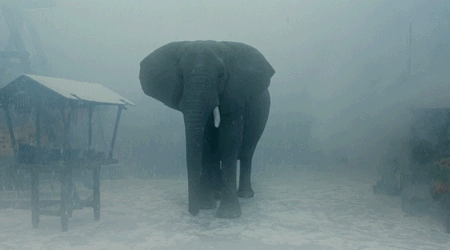
|
|
|
|
I think the idea of wiping the Vardies is that it severs them from their programming to serve the needs of the humans, leaving only their identity as a new species. So he's not wiping their minds, he's wiping the weird stuff that was coexisting with their minds. The big missteps imo are making the process of wiping them such a lighthearted ending (if the Vardy remember they killed humans then making amends could be what they get out of letting humans live in their city, for example, because else can you really offer them) and leaving it so long to establish that they even have minds, the resolution cones out of nowhere and morphs it at the last minute from "malfunctioning technology" to "diplomatic incident with natives". Still, grading on a Frank Cottrell-Boyce-shaped curve, this is an amazingly good episode.
|
|
|
|
2house2fly posted:I think the idea of wiping the Vardies is that it severs them from their programming to serve the needs of the humans, leaving only their identity as a new species. So he's not wiping their minds, he's wiping the weird stuff that was coexisting with their minds. The big missteps imo are making the process of wiping them such a lighthearted ending (if the Vardy remember they killed humans then making amends could be what they get out of letting humans live in their city, for example, because else can you really offer them) and leaving it so long to establish that they even have minds, the resolution cones out of nowhere and morphs it at the last minute from "malfunctioning technology" to "diplomatic incident with natives". Still, grading on a Frank Cottrell-Boyce-shaped curve, this is an amazingly good episode. Likely true, but the ending is so rushed and perfunctory that it hardly reads as anything at all. There's additionally the problem that the prior climax involved the Doctor trying to blow everything up and then reversing himself to save the colonists; firstly, why not investigate before ignorantly killing everyone? Secondly, as he discovers, the Vardies are also alive, so why is he so unremorseful that he almost committed genocide? The Doctor, of all people, should feel guilty about that. The big ending betrayal is that the Doctor's set up as a teacher in The Pilot. Teaching pupils by wiping their minds doesn't seem very practical. The episode establishes that the protocols restricting the Vardies are the problem-if they didn't feel any need to keep humans happy they'd not have killed them-so removing those would be a step toward a solution and they could cram in a negotiation montage after that, ideally by cutting the "blow it up" subplot entirely by having the Doctor enter the ship to rig up a warning instead, or to set up some kind of EMP to disable the Vardy, or anything that doesn't necessitate a dramatic climax that overshadows the actual dramatic climax of saving (almost) everyone.
|
|
|
|
Smile https://www.youtube.com/watch?v=iS9MCG3UO08 A bsam B adhuin And More AndwhatIseeisme Blasmeister Senerio WeirdSandwich Wolfechu C 2house2fly all-Rush mixtape Big Mean Jerk jng2058 Llab Red Metal Rochallor Stabbatical thrawn527 D cargohills The_Doctor F Nobody was willing to go this far. Overall Average Guess: 2.3 (C+) Standard Deviation: 0.8 Current rankings: all-Rush mixtape: 1 cargohills: 1 jng2058: 1 Llab: 1 Big Mean Jerk: 2 The_Doctor: 2 thrawn527: 2 2house2fly: 3 Red Metal: 3 Stabbatical: 3 WeirdSandwich: 3 adhuin: 4 And More: 4 AndwhatIseeisme: 4 Blasmeister: 4 Rochallor: 4 Senerio: 4 Wolfechu: 4 bsam: 7 No more perfect scores! And, in fact, we're now back to a four-way tie for first, as a lot of the people who'd correctly guessed before take a hit this time. Plenty of show to come, and it's still anyone's game except bsam's!
|
|
|
|
IDK thought this would be more average. Like this feels like its strong points are stronger than average and its flaws are just.... average. The lovely setting, the inventive aspects of the scenario that feel pretty well-realized, the personal dynamics with a new companion even, are all better than I usually expect for a Capaldi season episode. The kind of boring monsters and extremely poorly thought out endings are just also kind of expected by now, but they aren't as bad as some of these have been. I can even kind of justify the monsters a little (not the ending, that's still poo poo). We're testing out a new doctor companion dynamic and it makes sense to put them in a danger that other companions have been in to see how they handle it. Plus it's been nine seasons of just the modern era, I can't help but think that anything they do will either feel like something they've done or be out of place with maybe a little grey area in between those options that I'm not sure I can expect them to reach for. E: Also, season 9 ended up really boring and a lot of episodes seemed to have concepts that were too out there for their writers to accomplish, like the arc of ME that never went anywhere and was trying for something deep and clever but ended up being poorly written and tedious... I kind of liked going back to something that was just an adventure. Hemingway To Go! fucked around with this message at 20:11 on Jul 23, 2017 |
|
|
|
So, I have some thoughts on this episode that I didn't want to try to cram into a couple of lines on top of the score sheet. Particularly, relating to computers and philosophy, a couple of my favorite things. The function of moral philosophy is, in a sense, applying the methodology of science to morality. We have certain things that we observe to be trivially moral (saving your child from drowning) or immoral (walking up to an innocent person and shooting them in the face in cold blood); from that data we attempt to extrapolate rules that can be used to guide our behavior in cases where the right thing to do is less obvious (your basic trolley problems, public governmental policy, that kind of stuff). The two main problems of moral philosophy are 1) what is the best set of rules for a society to follow? and 2) once we have established those rules, how will we get everyone to follow them? Many people assume that if 1 is made obvious, 2 will sort of happen by itself, but sadly just being right isn't generally enough to convince people, as the recent presidential election in the United States amply demonstrates. In any event, anyone who's taken a class on the topic has been exposed to the idea of Deontology vs Consequentialism, as those are the two most common moral frameworks today. (There's also Virtue Ethics, but let's not get silly here.) The basic concepts are that Deontology states that acts themselves are moral or immoral, whereas Consequentialism states that acts can only be judged to be moral or immoral based on the effects they have on the world. Of course, both of them have serious problems, because this is philosophy we're talking about. If you want to be a Deontologist, you have to wrestle with problems like "lying is wrong, but does that mean it's not okay to lie to someone to save someone else's life" and "what is the source of these rules". Despite the fact that we're working with computers here, who are at home with absolute rules, we're not going to talk about Deontology much, since the Consequentialist school is more relevant to this episode. Where I want to start is the concept of Negative Hedonistic Consequentialism, and I know that ten of you just fell asleep before getting through all three of those words. It's okay. The rest of us will forge ahead. "Hedonistic" in that phrase refers to what is being measured when testing in the consequence; in this case, pleasure and pain. Negative Consequentialism, meanwhile, refers to the idea that the best way of measuring consequences is by the absence of some quality rather than by its presence. Put it together, and we're talking about a philosophical school that advocates taking any action that minimizes pain. Of course, the main problem with this philosophy is that the obvious consequence is that you should painlessly kill every human being on earth. Heck, even painfully doing it is okay in the long run. No humans means zero despair, and it's not possibly for any number to be less than zero; any human might have a chance to feel pain at some point during their life, so that's the only way to ensure it stays at zero forever. If you only put value on the negatives, this is the result you'll inevitably come up with. With me so far? Okay, keep that in mind, and let's talk about computers now. As a software engineer, I've long since made peace with the idea that people do not understand computers. Everyone uses them, but they only have the most trivial and surface ideas about how they actually function. And that's okay! Neophyte techies will tend to make fun of people for this, but the reality is that everything that seems clear and obvious to you after years of training (or even just noodling around on your own) is totally opaque to people whose aptitudes and expertise lie elsewhere. For them, computers are basically demons who operate by magical rituals; as long as you perform the ritual correctly, the demon will serve you, but if you get it wrong, or even if it's feeling wrathful that day, it will fail you in unexpected and sometimes terrifying ways. As a result, the way computers are dealt with in fiction is always to make them just a little bit magical; we've all seen the emotionless computer that ends up being a little too attached to people (the demon incarnate), or the genius hacker that can shut down alien spacecraft with their laptop (the wizard, or perhaps the high priest). Nevertheless, I do think that if you're going to write a piece of fiction that absolutely hinges on the way computers work, you ought to spend a little time understanding the basics. Now let's start combining these concepts. You're a person trying to program a group of intelligent systems to help humanity survive in a completely unknown environment. You don't know what they're going to encounter out there. But the survival of these people is crucial. They're your entire nation, your entire people, everything that's going to be left. Of all the gifts you can give to your magical conjuration, what do you give them? Certainly, the power to shape the land and become structures is vital, but what else? Maybe the answer is: a sense of morality. You want them to want to protect the people under their care, at least in the sense that computers can want anything, which frankly isn't the same as human beings wanting things. It has to be part of their core programming. And it's so easy to imagine, in all the rush of trying to escape earth, that someone made a simple logic error; they prayed that their demons would minimize the pain and fear of the colonists instead of maximizing their happiness and productivity. And the consequences of that prayer were, as you see, disastrous. And this is another area where I think the episode comes so close, but misses; the episode describes what happens as if it were some kind of error, or a conclusion the robots came to on their own... but it just makes so much more sense as a simple logic error, of the sort that human beings have made even trying to determine moral systems for themselves. Why wouldn't we be able to make it when giving morality to our creations? I think the episode would be a lot stronger this way; it puts the blame squarely on humanity and our inability to understand the consequences of our choices. As it is, there's a weirdly puritan ethic to the ending which sticks in my craw a bit. The Doctor berates the colonists and tries to make both sides equally "bad"... but the reality is that the colonists have done nothing wrong aside from not paying attention to a person that they don't know who tells them a bunch of people they love are dead and expects them to be rational about it. Let me make a revolutionary statement: there is nothing wrong in asking machines to make our lives easier. People like this image of artificial intelligence in chains, but these aren't demons that might have their own thoughts or feelings, or programs that some researcher randomly created with no reason except to determine if it could be done. They were made for the specific purpose of making peoples' lives easier. It's the only reason they exist! It's core to their programming! It is very literally the only thing they lived for! By wiping that out, the Doctor isn't freeing them, he's fundamentally altering their purpose into something else. And Lord knows what that will be, although hopefully it all works out in the long run. Which is significant here because the Doctor is himself acting as a Consequentialist. It's easy enough to just say that mindwipes are bad, but it seems like that isn't the way he thinks about them; maybe sometimes a mindwipe is the only way of dealing with a difficult situation while still allowing for a reasonable outcome. Should he really feel guilty about that? Should he feel as guilty as someone who installed unnecessary circuitry in trees for some reason? More importantly, if he has access to the computers, can't he just shut them down temporarily so they can be reprogrammed without a memory wipe? The episode leaves a bunch of these questions on the floor at the end, and it's a shame. It feels like the only reason the mindwipe had to happen was to reinforce this idea that humanity is somehow wrong for making machines to do these tasks in the first place; that's also why it can't be a logic error on our parts that causes the murders. It has to be an inevitable consequence of our desire to make machines to do work, and the solution to the immediate problem has to also solve that one, and that just makes it a weaker episode in general for me.
|
|
|
|

|
| # ? Apr 16, 2024 06:01 |
|
Interesting stuff idonotlikepeas! Just a couple of thoughts I got coming out of that: Due to the time constraints, plus how late the idea of the Vardy developing an emotional depth/sense of self comes in, I get the sense that we're meant to think of the Vardy as robots run amok at first. By that I mean I always thought the idea was that the Vardy becoming murderous was meant to be seen as a result of a (very human) blindspot in their programming as opposed to any malicious intent, and it's only at the end that we get the sense that they started killing people because they were starting to develop consciousness, albeit an "alien" one that doesn't grasp why killing people is a bad thing. The Doctor's mindwipe is meant to be seen as a good thing, I think the idea is that their core programming was restricting their growth as a species in its own right. Once they no longer had conflicting "make sure the humans are happy" "keep the colony operating smoothly" imperatives to deal with, they're free to develop as their own thing, with the humans just another race for them to figure out how to live peacefully with (and come to a better understanding of what humans actually are). The problem, as we've all noted, is that most of this information comes quite late and is poorly conveyed, AND has to sit directly next to an episode where "mindwipe = bad", following the previous season where the mindwipe caused the Doctor great distress, within a revival where Donna's mindwipe was shown to be a fate almost worse than death. You can make an argument that it was necessary, but then I think it suffers somewhat from the same issue as The Zygon Inversion had (amongst many, many other problems) where it's a very lopsided situation - it's the Vardy who get mindwiped, not the humans, so even with the Vardy coming at the situation from a blank slate the humans are going to be bringing a shitload of baggage with them. Had they nailed the ending this could have been an all time classic episode. As it is, it's still good, just things kinda fall apart at the end. Jerusalem fucked around with this message at 01:08 on Jul 24, 2017 |
|
|






